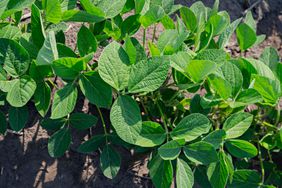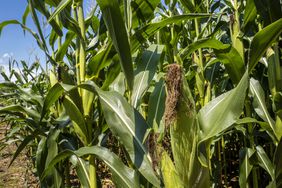:max_bytes(150000):strip_icc()/SoybeansNoTillSunrise-WideShot-2000-1c9984a8242642238072652ff0a6d2d6.jpg)
FMC Corporation has submitted two new active-ingredient microbial pesticide strains, RTI 301 and RTI 477, and associated formulated products, to EPA for regulatory approval, which is expected in 2020.
This unique combination of two bacilli strains offers a new option for growers to suppress some difficult to control and yield-robbing diseases such as sudden death syndrome (SDS) in soybeans as well as Fusarium, Rhizoctonia, and Phytophthora. The two strains are intended to complement each other, says Kaustubh Borah, North America commercial manager and business development lead for plant health at FMC.
These products grow along the roots of a crop, forming a biofilm that helps keep diseases at bay. "They help the root outgrow any early damage. That leads to higher root mass and higher yield," Borah says.
In field crops, RTI 301 and RTI 477 biologicals can be used as a seed treatment or in-furrow, with low use rates and in combination with existing seed treatments and in-furrow products. "As we bring these applications to the market, they won't displace any package available on the marketplace, but they will enhance them," Borah says.
In other crop applications, it can be used as a transplant biological.
The company has research that shows yield improvement from RTI 301 and RTI 477 is "measurable" Borah says. "It varies based on pest pressure from one field to another, but we see good, measurable yield differences."
He points out that the benefit from biologicals typically comes when growing conditions are not ideal. "When there is fungal pressure, you really see a measurable yield difference. When conditions are perfect, you may not see much difference."
Continued Investment
FMC aims to be an industry leader in biological products, having last year received EPA registration for a Bacillus licheniformis strain FMCH001 and Bacillus subtilis strain FMCH002, as well as two associated formulated products, in May 2018. It has a robust research and development pipeline. It's a tough sell with growers facing a myriad of crop protection product choices.
"But growers are looking for additional modes of action. Whether they are synthetic or biological, growers just care about yield," Borah explains. "But seeing is believing. They need to see the performance firsthand. Seeing is believing."









